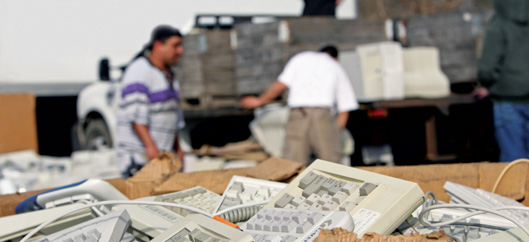Beyond Paper & Plastic
At Andrews University recycling isn’t limited to paper and plastic. That’s why students worked in collaboration with Berrien County to divert unconventional items—such as computers and televisions—from the dump to recycling centers. Having a more eco-friendly mindset means everything from the small and simple to the big and bulky is reused to better the world.

In April 2008, Andrews hosted a county-wide electronic recycling event, uniting students, faculty, and local residents in a joint effort to recycle mass amounts of electronic devices. Eager volunteers successfully packed two 53-foot semi-trucks along with an additional two 24-foot trucks, full of electronic material. The event successfully diverted 56,709 pounds of electronics from landfills and set them on route to a more useful endpoint in recycling. (The next e-cycling event at Andrews is scheduled for April 15, 2009.)
Each year, the United States produces one billion pounds of electronic waste. This includes computers, keyboards, monitors, televisions, VCR’s, stereos, cell phones and fax machines. These items, which are traditionally congested in landfills around the nation, serve a more elastic use when converted into newer items. By pulling the plug on digital dumping, Andrews University, in partnership with Berrien County, is taking recycling to the next level for the sake of a greener world.
Facts about E-Cycling
• Lead, mercury, cadmium and brominated flame retardants are among the substances of concern in electronics. When left in landfills, these chemicals can pollute the environment.
• Almost all of the materials used to manufacture a cell phone can be recovered to make new products. Metals, plastics, batteries and the packaging materials can be recycled and turned into new products.
• The plastic on cell phones can also be recycled into new products such as garden furniture, license plate frames, non-food containers and replacement automotive parts. Due to its high thermal value, the plastic could alternatively be used as a fuel.
• In 2007, approximately 18-percent (414,000 tons) of discarded TVs and computer products were collected for recycling.
• Wireless devices which have recyclable accessories include:
o Wireless phone handsets;
o Personal digital assistants (PDAs) that operate on wireless networks;
o Blackberries;
o Wireless computer cards; and
o Accessories such as spare batteries, phone chargers,
cables, earpieces, cases, clips and cradles.
Statistics collected from the Environmental Protection Agency website: http://www.epa.gov/epawaste/conserve/materials/ecycling/faq.htm